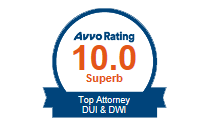Download our free Wisconsin OWI Penalty Chart here.
A Wisconsin operating while intoxicated (OWI) offense can result in much more than fines – your future and even freedom are at stake. Those who choose to plead guilty to drunk driving often find themselves sentenced to expensive court fees, a suspended driver’s license, incarceration and much more. Fortunately, an arrest does not equal a conviction, and it may be possible to successfully fight off your OWI charge.

Act Swiftly – Or Risk Your Driving Privileges
OWI arrests are punishable by both administrative and criminal penalties. Because driving is regarded as a privilege, the State has the authority to take your driver’s license way upon arrest for drunk driving—or if you refuse to participate in the breath or blood test. You do have 10 days to request an administrative license hearing, but failure to act within this tight time frame will result in the automatic suspension of your license. A seasoned OWI attorney can handle this administrative matter to ensure your appeal is filed before the deadline.
Featured in The Media





OWI and Your BAC
Under Wisconsin law, having a blood alcohol content (BAC) over the legal limit of .08% is enough to be charged with violating the state’s prohibited alcohol concentration (PAC) laws—even if your ability to drive was not actually compromised. There is a .02% BAC limit for fourth and higher offenses. In addition, minors under 21 who violate the Zero Tolerance law by having even one drink can be charged with OWI and sentenced to fines and a driver’s license suspension.
Potential Consequences for a Conviction
The penalties for an OWI conviction depend on the number of prior offenses on your record. While you may escape a jail sentence for your first conviction, jail time is a requirement for each subsequent offense. Other potential penalties besides jail could include fines, an alcohol assessment, community service, and the installation of an ignition interlock device. But that’s not all—you will also acquire a criminal record that could have an impact on your future employment as well as your ability to leave the country or secure custody of your children.
Below is a summary of the OWI/DUI consequences:
First OWI Offense
A first OWI offense will likely result in no jail time.
Second OWI Offense
A second OWI conviction will lead to a short stint in jail. The sentence will likely be between 5 days and 6 months in jail.
Third OWI Offense
A third OWI conviction will lead to a jail sentence between 45 days and 1 year.
Fourth OWI Offense
A fourth OWI conviction has a minimum jail sentence of 60 days and could result in 6 years in jail.
Fifth or Sixth OWI Offense
If a person is convicted of a fifth or sixth OWI, the minimum prison sentence is 6 months and the maximum prison sentence is ten years.
Seventh, Eighth, or Ninth OWI Offense
With a seventh, eighth, or ninth conviction, the defendant will face between three and twelve and a half years in prison.
Tenth or Higher OWI Offense
If a person is convicted of their tenth OWI offense, the prison sentence will be between four and fifteen years.
Fines for OWIs
Most OWI convictions will result in a fine as well as jail time.
- • 1st offense OWI – The fine can be between $150 and $300 and a $365 OWI Surcharge.
- • 2nd offense OWI – The fine can be between $350 and $1,000 and a $365 OWI Surcharge.
- • 3rd offense OWI – The fine can be between $600 and $2,000 and a $365 OWI Surcharge.
• 4th offense OWI and beyond -There will be a mandatory minimum fine of $600 and a maximum fine of $25,000.
Assessment for Alcohol Abuse
A person convicted of an OWI may have to undergo Alcohol Use Assessment. An Intoxicated Driver Program (IDP) Assessor will meet with the driver and interview them about their alcohol and drug use. This interview is used to determine if the driver has a substance abuse issue and if rehabilitative treatment is required.
If the Assessor determines a pattern of substance abuse, the driver will have to undergo the recommended treatment within 30 days of the order being issued. This can include enrollment in Alcohol education programs or community-led alcohol abuse programs.
Community Serviced and Deferred Sentences
At times, the judge may choose to defer the jail time in favor of probation or community service. Probation requires the driver to comply with certain rules in their day-to-day lives, which can include a curfew and abstaining from alcohol or drug use instead of going to prison. Community service gives a convicted person the opportunity to give back to the community in a positive way instead of spending time in jail.
Both of these possibilities are at the discretion of the judge and maybe given out in cases in which the state wants to rehabilitate someone instead of simply punishing them for their actions.
Ignition Interlock Device
After an OWI conviction, a driver may be required to have an Ignition Interlock Device (IID) installed in their vehicle. This device requires the driver to breathe into the machine and will check for alcohol on their breath before allowing ignition.
Once the driver is on the road, they may be prompted to perform another breath test to continue driving. If the device detects alcohol, the vehicle’s flashers and the horn will activate until the car has been pulled off the road.
An IID will be required for any OWI convictions with one exception: if it is a first offense OWI conviction the BAC result was less than .15. In any other circumstance, the IID will be required.
Aggravating Factors in OWI Cases
In addition to the general outlines based on how many previous offenses have occurred, there are a handful of other factors that will help determine how severe the potential repercussions are.
- • If anyone was injured or killed, the consequences will be significantly harsher and jail time will increase.
- • If a person under the age of 16 was present in the car at the time of the OWI, the jail time will likely double because a minor was endangered by the OWI.
- • Full cooperation with law enforcement will likely help reduce the charges.
- • A lower BAC will generally lead to less jail time and an extremely high BAC can increase jail time.
All of these details will have a major impact on sentencing in addition to the existence of prior OWI convictions.
Wisconsin OWI FAQ’s That People Ask Online:
How long does an OWI stay on your record in Wisconsin?
An OWI conviction is permanent. Any OWI arrest committed after January 1, 1989, will appear on your record. If for example, you had an OWI conviction in 1991, it would be on your record if you were to be arrested and charged with another one.
Will an OWI arrest be on my permanent record in Wisconsin?
In Wisconsin, your first offense is a civil offense. It will always be on your driving record, but it will not be on your criminal record. Any subsequent OWI convictions will be on your criminal record.
What happens if you blow below .08 BAC in Wisconsin?
.08 is the legal limit for driving. If you were to blow below that on a Breathalyzer, it will be much harder for the prosecution to convict you of an OWI. However, other tickets can be issued to you, like reckless driving. The consequences will also depend on how far below .08 your BAC was.
What happens if you blow above .15% BAC?
If you are charged with your first OWI and your blood alcohol concentration is above .15%, you will likely be required to have an ignition interlock device installed on your car.
Can you explain how the warrant is obtained for the blood draw in an OWI Case?
When you are under suspicion of an OWI, the officer will read you the accused form. At that point, if you don’t consent to have your blood drawn for a BAC test, the officer will call a judge. The officer will then explain to the judge the circumstances of the arrest and the probable cause to arrest you for an OWI. At that point, the judge will decide whether or not there is enough evidence to issue a warrant for a blood draw.
Is there a way to refuse the blood draw?
You have a legal right to refuse a blood draw, but there are consequences for doing so. If the court reviews the circumstances of the case and determines that the refusal was invalid, they will revoke your driver’s license for one year, and require that an ignition interlock device be installed in your vehicle. In a court case, a refusal to have your blood drawn can be used as evidence of your intoxication and lead to a conviction.
How do I get police reports for my OWI in Wisconsin?
Wisconsin has good open records laws. You can file open records request with the police department. They are then legally required to give you the record associated with your case, which includes the police report. An exception to this is if there is a current investigation, then the reports need to be requested from the prosecutor.
Can you explain the notice of intent to suspend the driver’s license after an OWI arrest?
A notice of intent to suspend is issued by police where there is a prohibited test result. The Department of Transportation is taking steps to suspend your license for six months. If you wish to contest this revocation, you only have 10 days from the date on the notice. It is crucial to act quickly.
How do you protect your driver’s license while fighting an OWI in Wisconsin?
Every case will be different, but if the notice of intent to suspend is issued, then you must file a request for an administrative review hearing. Our firm will do that for our clients when they hire us for OWI cases.
Will I lose my license if I refused the breath test?
You must request a refusal hearing within 10 days.
Can you explain what will happen at the OWI administrative hearing?
An administrative hearing is a brief hearing. It’s also limited by statute, meaning that it’s about 15 minutes. The arresting officer will often be in attendance, as will an administrator review examiner. The officer will be asked to provide the details of the arrest and the sobriety tests. Your attorney will then be allowed to argue why your license should not be suspended.
What happens if you are arrested for OWI and you’re under 21 years of age in Wisconsin?
Even if you are under the age of 21, your OWI case will be handled as if you were over 21. The system will not reduce the charges because you are young. It is very important to seek legal counsel if you are facing an OWI charge and you are under 21.
OWI Defense Book
By: Tracey Wood
What Sets Us Apart
Most Cases are Reduced or Dismissed
We are proud of our record with our clients. You deserve an attorney who can help prevent you from acquiring a criminal record.
You Get a Team of Lawyers
Our firm works as a team. You will have access to all of the attorneys at our firm, and all of their knowledge and ideas. We will work together on your behalf.
We Empower & Educate You – At No Cost
We take pride in educating any potential clients through our free case assessments. Even if you choose not to hire us, you will have a better outlook on your case after meeting with us.
Highly Awarded Firm
We’re honored to be some of the most highly-regarded criminal defense attorneys in Wisconsin. We have won many awards in recognition of our work.
Award Winning Book Author
Tracey Wood is a widely respected resource for criminal and OWI-related defense. As an author and attorney, her work is frequently cited by other defense attorneys, prosecutors, and even judges.
TV & Radio
We are routinely contacted by the media to speak about defending and winning high profile cases.
Testimonials
Reviews
Sample Google and Facebook 5 Star Reviews:
“Tracey Wood & Associates care about you. They treat you fairly and fight hard for your rights and your livelihood. I whole-heartedly believe they are the best law firm in the state, and highly recommend them to anyone in need of an attorney.”
“I wanted to work with the best law firm. I had too much to lose. The attorney at Tracey Wood & Associates convinced the district attorney not to go to trial. I will never forget how grateful I was when I found out my charges were dismissed. Thank you to the whole team at Tracey Wood. No matter what you are facing, they can help you.”
Invest in Your Future by Hiring an Experienced Attorney Today
When you’re facing a criminal offense—like OWI—having an experienced legal team on your side is imperative. With specialized training in OWI evidence, the attorneys at Tracey Wood & Associates have the knowledge and credentials necessary to take on your case. In fact, Attorney Tracey A. Wood was the first of two attorneys in Wisconsin ever to be appointed to the National College of DUI Defense’s Board of Regents and was the first female attorney appointed to that Board throughout the country.
Avoiding the repercussions associated with an OWI charge is possible, but you need to act promptly. For information on the next steps you should take at this critical time, please complete our convenient online form for a no-obligation analysis of your case.
Call 1-888-597-3622 or Schedule a Free Case Evaluation Online
Contact Us
“Not Guilty” – A Guide for Defending
Criminal Cases
Awards






